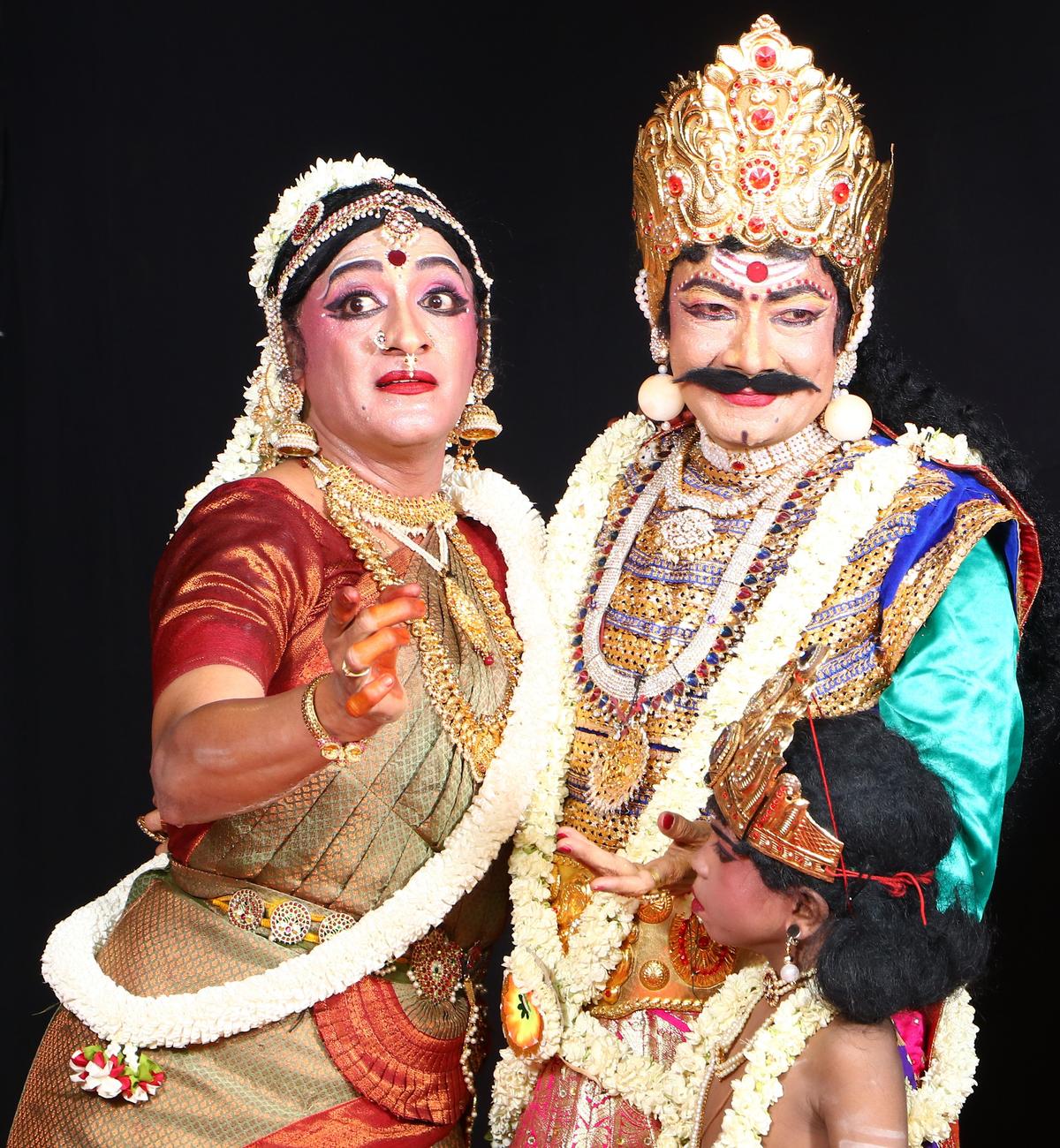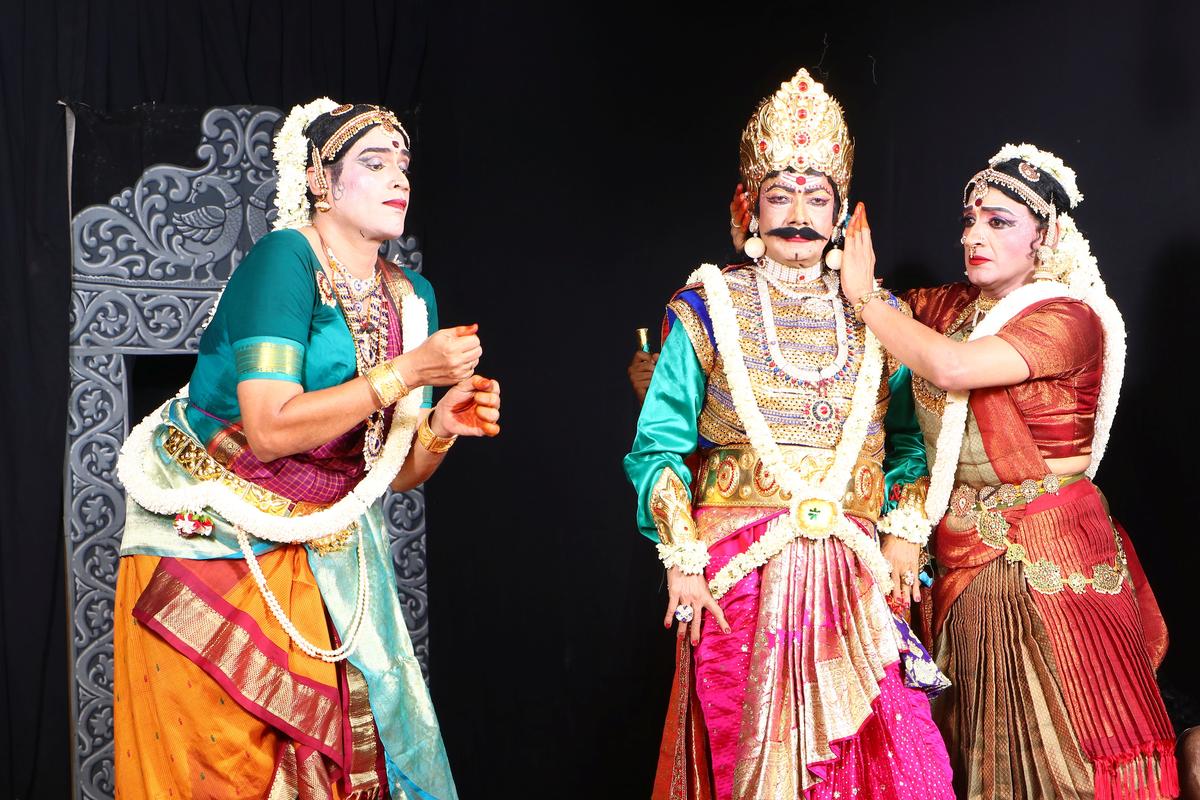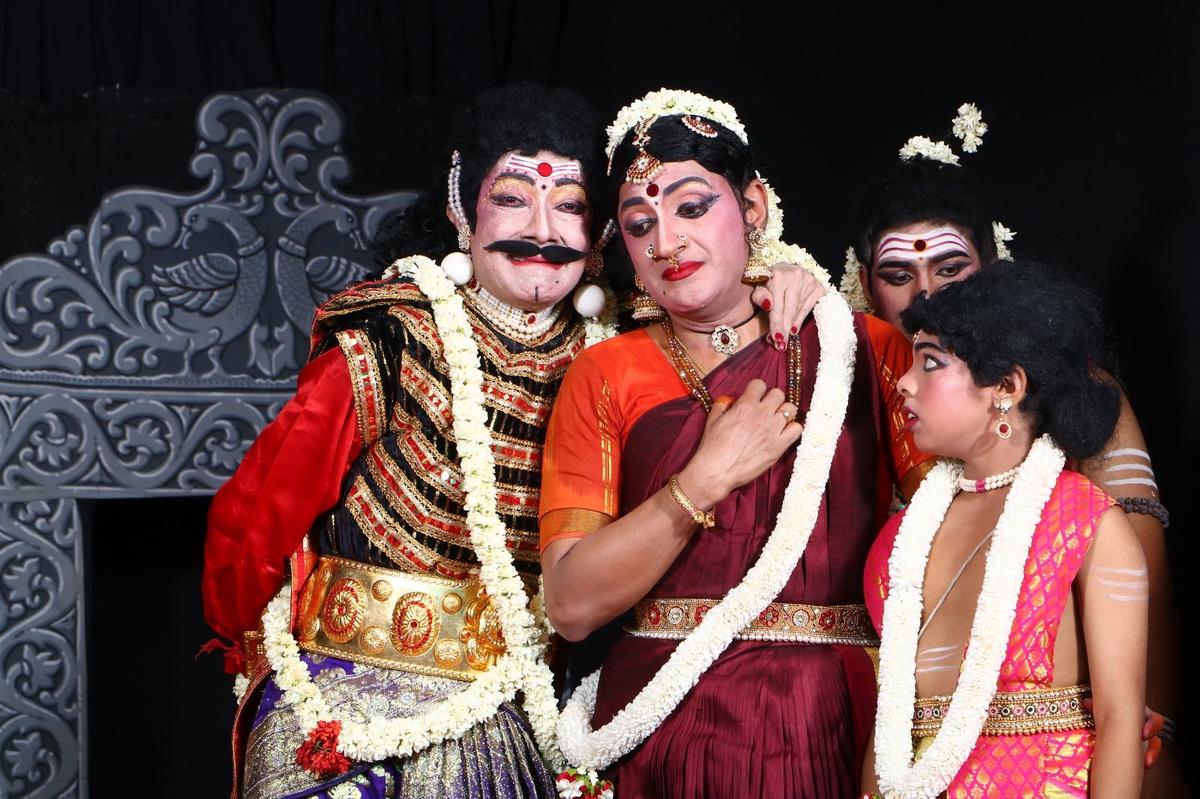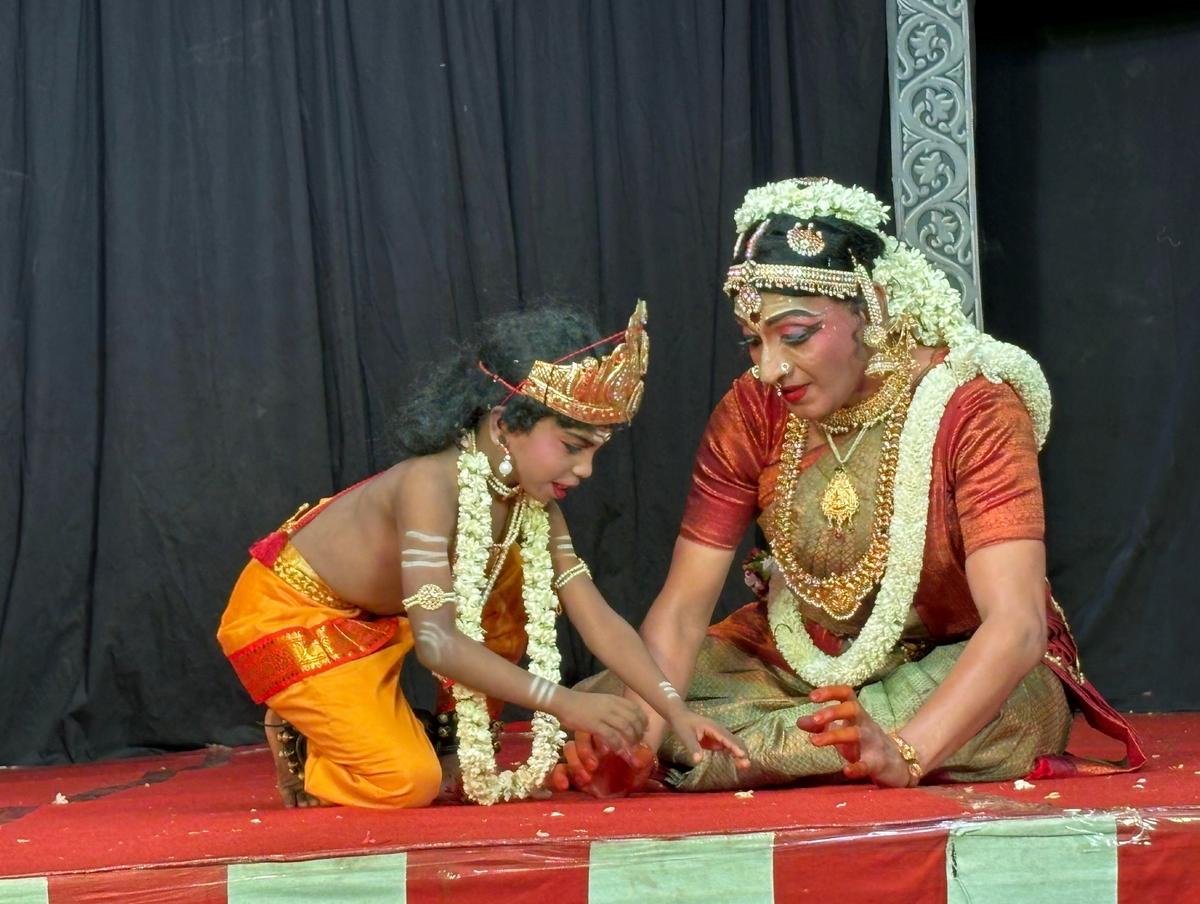
Every year, during the month of May, a village not too far from the Chola heartland of Thanjavur lights up with much pomp and grandeur. Narasimha Jayanthi, a Hindu festival that is celebrated in the month of Vaisakha holds great significance for the village and hence a grand fortnight-long Nritya-Nataka Utsavam is organised.
In the truest sense Melattur is an art village because it has produced some of the most outstanding artistes, composers and personalities, who have made unparalleled contributions to art. Even today, the plays composed by the eminent playwright Melattur Venkatarama Sastri are enacted to honour the great artistic legacy of this village. The unparalleled and heartwarming hospitality that is offered by villages to their guests needs no elaboration. Members of every household guide visitors to the Varadaraja Temple where a stage is put up on the street, facing the deity.
Sustaining a tradition like Bhagavata Mela is a monumental task and the festival thrives even today due to the efforts of several artistes and art lovers. The family of the renowned dance guru and Bhagavata Mela exponent Melattur S. Natarajan continues to organise the Utsavam even after his passing. Natarajan’s brother Kumar took over the baton and has taken several steps to ensure a larger audience attends and, most importantly, appreciates the worth of the tradition.
The entire fest is livestreamed for the benefit of global audiences. In addition to this, Kumar has released several videos on the group’s official YouTube channel, demystifying the nuances of the tradition by featuring every member involved to highlight their individual contributions as well. Performance slots are also offered to budding dancers and reputed dance schools who participate with involvement to be a part of this grand tradition.
Music plays a significant role in this dance-theatre form. Perfecting the songs for the plays demand a specialised approach. And Melattur S. Kumar’s portrayal of Harischandra, with extensive usage of footwork, aligns to the music and percussion.
| Photo Credit:
N.C. Srinivasaraghavan
Bhagavata Mela dramas invariably prove to be a musical treat and this aspect needs to be examined separately to fully understand the appeal of these Natakams. The twelve Telugu dramas written by Venkatarama Sastri are full of traditional daruvus of different contexts – pravesha daruvus, uttara pratyuttara daruvus, samvaada daruvus, svataata daruvus, pralaaba daruvus, etc. Every Daruvu is a gem in terms of the literary and musical devices that have been incorporated by Venkatarama Sastri. Employing the choicest poetic expressions both in the dialogues as well as the lyrics of songs, Sastri has ensured that lovers of the Telugu language rejoice every phrase. Each character has a unique personality and every Paatra Pravesha Daruvu (self-introductory entrance) attempts to paint a portrait of the qualities of the character, requiring musicians and dancers to be aware of both the musical as well as contextual aspects. The daruvus are set in difficult ragas such as Ahiri, Ghanta and Maanji apart from ghana ragas such as Shankarabharanam and Arabhi. It is to be noted that Venkatarama Sastri’s musical expertise is evident from how he entirely disproves the belief of using a particular raga only for a certain rasa or a personality type. As an example, one can hear a Paatra Pravesha in Atana, a raga representing Veera rasa, for a graceful female character. A strong and fearsome male character surprisingly uses Kalyani, a raga that is typically thought of to represent grace and beauty.

From the play Harischandra Part 2.
| Photo Credit:
Photo Courtesy: Melattur Bhagavata Mela Natya Nataka Sangam
Carrying forward a great Guru Parampara that traces itself back to Saint Tyagaraja himself, Tiruvaiyaru Brothers (S Narasimhan and S Venkatesan) lead the musical orchestra that is an integral part of these dramas, along with L. Prabaharan. Perfecting songs that are part of a Nritya-Natakam demand a specialised approach as they require musicians to adhere to the composer’s artistic vision in terms of ragas and overall bhava in addition to working closely with the dancers onstage. It is optimistic to note that the children of these singers N. Venkatasubramanian and V. Venkatakrishnan are now assisting them to preserve the family’s heritage. The other long-time instrumentalists who are part of the orchestra include Lalgudi K. Ramaprasad on the violin and B. Gokulakrishnan on the flute, who greatly contribute to the dramas by way of calculative musical interludes and aesthetic raga insertions, in addition to accompanying the vocalists.
Mridangam is of paramount importance in the dramas and requires knowledge of the contents of the songs as well as anticipating the moves of the dancers onstage and coordinating with their footwork. Nagai P. Sriram single-handedly provides percussion support, offering much-needed rhythmic diversity for every line that is musically repeated several times with different lyrics in a typical Bhagavata Mela Daruvu.

From the play Harischandra Part 1.
| Photo Credit:
Photo Courtesy: Melattur Bhagavata Mela Natya Nataka Sangam.
The play Harischandra covers the life story of Raja Harischandra focusing on his travails as he struggles to fulfill his promises to sage Vishwamitra, who demands his entire wealth and even his kingdom. Playing the titular character, senior Bhagavata Mela performer Kumar retains a distinct style of presentation associated with lead male characters. Quite like the Yakshagana tradition, Kumar’s unique portrayal of Harischandra with extensive usage of footwork aligned to the music and percussion along with syncing of the lips to the song being sung with appropriate expression is to be appreciated as a rare skill. Kumar mastered the basics of this style from his father, the late G. Swaminathan, taking great efforts to inherit the finer aspects. Kumar’s performing skills especially stood out when his character is forced by circumstances to work in a cremation ground. His energy and enthusiasm onstage elevate the plays.
Senior dancer Srikanth Natarajan, who is a part of Bhagavata Mela for the last 45 years, plays Chandramathi, a role that earlier belonged to the late veteran Melattur Natarajan. Srikanth, who is known for his mature Saatvikaabhinaya aced this role. A particular Daruvu, reserved for Chandramathi in raga Ghanta, is one of the play’s highlights. The Daruvu talks about Chandramathi recollecting the privileged life that she led earlier, before being forced to work for an elderly man. Srikanth’s lokadharmi where he portrayed Chandramathi performing daily chores was quite convincing. Nagai Sriram’s mridangam enhanced the musical quality of this Daruvu. Srikanth’s expressions, upon hearing the bad news that Chandramathi’s son Lohitaksha dies, were poignant and stirring. It is noteworthy that Srikanth took utmost care to regulate his facial expressions even when he stood on the stage when other characters spoke. There is no doubt that the character of Chandramathi is an integral part of the play and no one could have done it better.

From the play Harishchandra Part 2.
| Photo Credit:
Photo Courtesy: Melattur Bhagavata Mela Natya Nataka Sangam
Mathanga Kanya is a seductress sent by Vishwamitra to entice Harischandra. The character is feisty, flirtatious, and provocative. Senior dancer Vijay Madhavan has a separate rasika base just for the portrayal of this character and he has developed and carved this character with a personal touch over the years. It would not be an exaggeration to state that Vijay gradually explores the multi-hued personality traits of Mathanga Kanya in a layered manner every year. This time he chose to utilise the staircase leading up to the stage to position himself as he plays the veena in the Nadanamakriya daruvu. The tense situation that prevails between Mathanga Kanya and Chandramathi as they throw shade at one another in rivalry is a scene to behold on its own. Vijay must be appreciated for his expert handling of the overt shringara in these pieces in a manner befitting the nature of this tantalising female character.

From the play Harischandra staged at Melattur Bhagavata Mela mahostsavam.
| Photo Credit:
Photo courtesy: N.C. Srinivasaraghavan
Bhagavata Mela brings together people of various age groups and this is a positive feature of these dramas. Children like Rakshit A and Sudarsan S sincerely portrayed Lohitaksha. Octogenarian R. Varadarajan astonished viewers with his authentic portrayal of the king of Kashi. Special mention must be made to Venkatasubramaniam who played Nakshatriyan, a comical character that left the audience in splits. Young dancer Sundaresan Pandurangan was an apt choice for the character Madanavathi. It is encouraging to note that the children of the present actors and dancers take up roles in these dramas. It is important to pass on the art to younger dancers gradually to ensure continuity and this is something that Kumar has been working on consciously.
A suggestion to make the dramas more audience-friendly would be to make available copies of books that contain the lyrics and Tamil/English translations of the Telugu Daruvus and dialogues, so that rasikas who do not know Telugu can also completely grasp the finer aspects that highlight the literary genius of Venkatarama Sastri.






